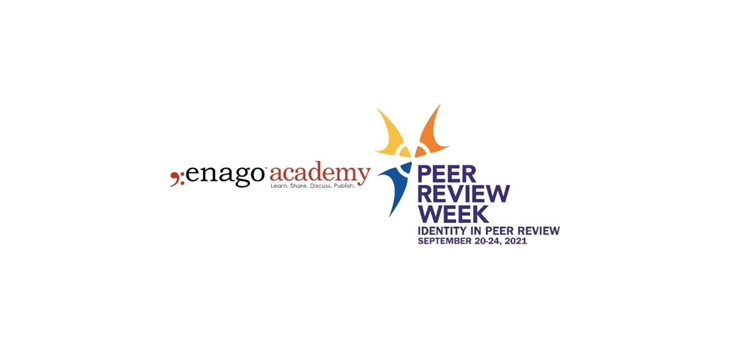Reflecting on Peer Review Week 2021 at Enago: Facts and Insights

Like every year, Enago—a global leader in editing and publication support services, participated in the Peer Review Week 2021 as a core member of the organizing committee. At Enago, we look forward to celebrating this mega event with a motive to curate a unique and intellectually stimulating ensemble for researchers worldwide. Multiple teams join hands and brainstorm to bring out a successful execution via several activities throughout the week.
This year’s Peer Review Week released its theme “Identity in Peer Review”, which is the first to be selected through an open global survey. The announcement of the theme followed discussions and plans of contrivance. Beginning from September 20th through 24th, Enago explored the multifaceted roles of identities in peer reviewing process that brings diversity, expectations, perspectives, experiences, knowledge, and skill together. What validated our effort and elated us, is the participation of over 4000+ researchers from across the globe who joined us and participated in this mega event. So now as we look back at what we’ve been able to put forth, we realize that the outcome has been an amalgamation of facts, insights, opinions, collegiality, and an aspiration of a progressive future.
Multifaceted Perspectives in Diverse Activities
Going beyond the conventional means of knowledge dissemination, we curated and released different formats such as video interview, webinar, blog post, global survey and exclusively designed checklists for peer reviewers and authors. As complex and critical as the theme was, it was an interesting one with an intent to evoke balance in diverse perspectives from different regions and varied disciplines of academia and scholarly publishing. Here, we share an overview of all the moments of learnings from activities organized by Enago.
Video Interview
To Unmask “Identity in Peer Review” or Not?
We conducted a video interview segment comprising a panel of 7 experienced peer reviewers from multiple disciplines and geographies who shared their opinion on 8 interesting questions related to “Identity in Peer Review”. Their insights on the current peer-reviewing system, and how can we achieve an ideal peer-reviewing system brought in a new perspective amongst scholars. Whilst sharing their experiences, the interviewees also spoke about the substantial changes made in review procedures over the years. Their views of “Identity in Peer Review” were very vivid and insightful.
Some of the highlights from the interview are:
I check three dimensions: if the content is well stated, if it is well-founded, and if the writing structure of the journal is respected. The author’s identity does not matter.
– Marcelo Manucci, Ph.D. (Communication, Psychology)
Experienced peer reviewer for international journals and author of 8 books on Communication, Leadership, Human Talent
“Accountability has to be built into the structure of the peer-reviewing system, which means when issues and concerns are raised, they must be sufficiently dealt with at once.”
– Neji Hasni, Ph.D. (Artificial Intelligence)
Distinguished editor and reviewer of international technical journals including IEEE Communications Magazine
“While double-blinded peer review system fosters freedom in providing critiques, it would be great if authors know who reviewed their manuscript, after it is published.”
– Santiago Perez-Lloret, Ph.D. (Neurophysiology and Neuropharmacology)
Awarded with the “Top Peer Reviewer” recognition by Publons and has made remarkable editorial contributions to international journals
“Double-blinded peer review increases scientific rigor and helps in fighting against increased unethical practices due to issues such as difficulty in acquiring funds without having published work in high impact factor journals.”
Vanessa Lanoue, Ph.D. (Neuroscience)
Over 10+ years of peer-reviewing experience for journals such as Molecular Psychiatry, Scientific Reports, and The Journal of Physiology
“Revealing identities in peer review increases opportunities for collegiality and collaboration. It increases potential of learning about a scholar and their work, which can be leveraged for more tangible collaborative research.”
Kimberley Skelton, Ph.D. (Art History)
Peer reviewer for Amsterdam University Press, Routledge, and Yale University Press
“Identities of authors are indirectly revealed due to self-citation. Despite this, a peer reviewer must apply ethical guidelines and not let the author’s identity influence any decision.”
Caroline Ntara, Ph.D. (International Business)
Exemplary peer-reviewing experience for scholarly journals on international trade and business
“Every peer reviewer should be open minded, scientifically sound, and most importantly fair in all circumstances.”
Dr. Olawale Alimi, Veterinary Surgeon
Peer reviewing experience for journals indexed in Scopus, PubMed, Web of Science, and SCImago
Blog Post
The Role of Identity in Peer Review- Moving Towards a Reliable System
Our blog post emphasized on how identities and diversities can strengthen and transform the peer-reviewing system. Additionally, it discussed the need of following several well-defined practices to develop and reliable peer-reviewing system. It has unbiased insights on the impact of today’s peer-reviewing system of diverse and experienced academics from different cultures bringing in a paradigm shift to the system. Additionally, the article discusses value of diversity, multiple perspectives, and contributions from numerous sources that add to the growth of academia and research. Finally, it provides a list of few practices to follow to pave your way towards a trust-worthy peer-reviewing system.
Webinar
Launching ‘Review Assistant’: An AI-powered Tool for Peer Reviewers
Another milestone at Enago was the conduction of a product launch webinar for Review Assistant—a pioneer AI-based tool for peer reviewers. Dr. Sourish Dasgupta (Professor, Entrepreneur, and an AI Specialist) was the speaker of the webinar, who is also the founder of Rax. The aim of this webinar was to help the audience understand how this AI tool facilitates the peer review process. With its never-like-before features that helps researchers and publishers with literature review, critical reading, concept extraction, semantic knowledge mining, content discovery, and recommendation. Review Assistant is one of the most efficient tools for researchers at all stages of their career.
Checklists
We designed and released handy peer review checklists for both reviewers and authors. A pragmatic and comprehensive checklist for reviewers ensures that a reviewer report provides detailed, constructive, and transparent feedback to improve the manuscript quality. In addition, Enago’s checklist for authors helps in solving the doubts after receiving a peer review report.
AI Global Survey
Understanding the Role of AI Automation and Tools in Academic Publishing
Unleashing our inquisitive neurons in search of garnering more knowledge, we conducted a global survey to explore the role and impact of AI technologies and tools on the future of academic publishing. The aim of this survey was to gather participants’ inputs regarding the development of innovative AI-powered tools that will simplify their publishing journey. Furthermore, the survey focused on understanding demographic perspectives about AI, the general perception and awareness about AI amongst academics, the rate at which AI-based tools are accepted by academics, etc. Additionally, the survey aimed at identifying the perceived benefits, limitations, drawbacks, and concerns related to the use of AI in academic publishing. This is just not it! 10 participants who shared insightful responses in this survey were rewarded with an Amazon voucher worth USD 25 each.
Learn Course
Becoming a Peer Reviewer
Our comprehensively structured course is designed by renowned expert Duncan Nicholas, President at European Association of Science Editors who has more than 16 years of experience working in the journal publishing industry. This course helps both early career researchers and established researchers to understand different models of peer review, how to assess a manuscript, structure a review report, provide constructive feedbacks, and much more.
Key Takeaways!
Keeping up with its tradition, this year’s Peer Review Week has also been a rewarding experience for all of us at Enago. Developing collegial relations with brilliant minds around the world and helping all our participants to add to their kitty of knowledge was a delight in disguise. But what gave us true sense of content and overwhelmed us, was when we received feedbacks and comments from our readers, webinar attendees, survey participants, and all our subscribers. Consequently, these responses have made us aware of how far have we reached and how can we pave our way ahead. We are grateful to everyone who has been a part of Enago’s celebration of Peer Review Week 2021!
You couldn’t join us then? Find all the above Peer Review Week activities under one roof and let us know your thoughts about it. If you wish to participate in Peer Review Week 2022 and enlighten the academic world with your ideas and insights, feel free to contact us at academy@enago.com.









